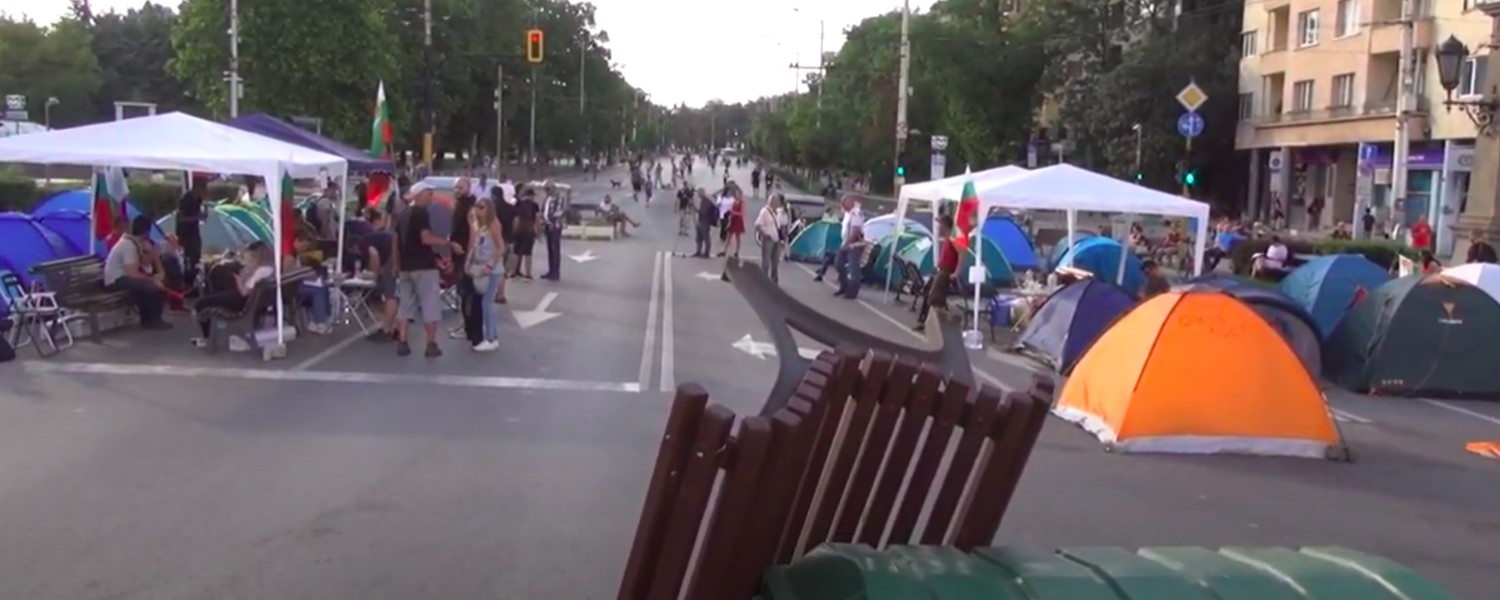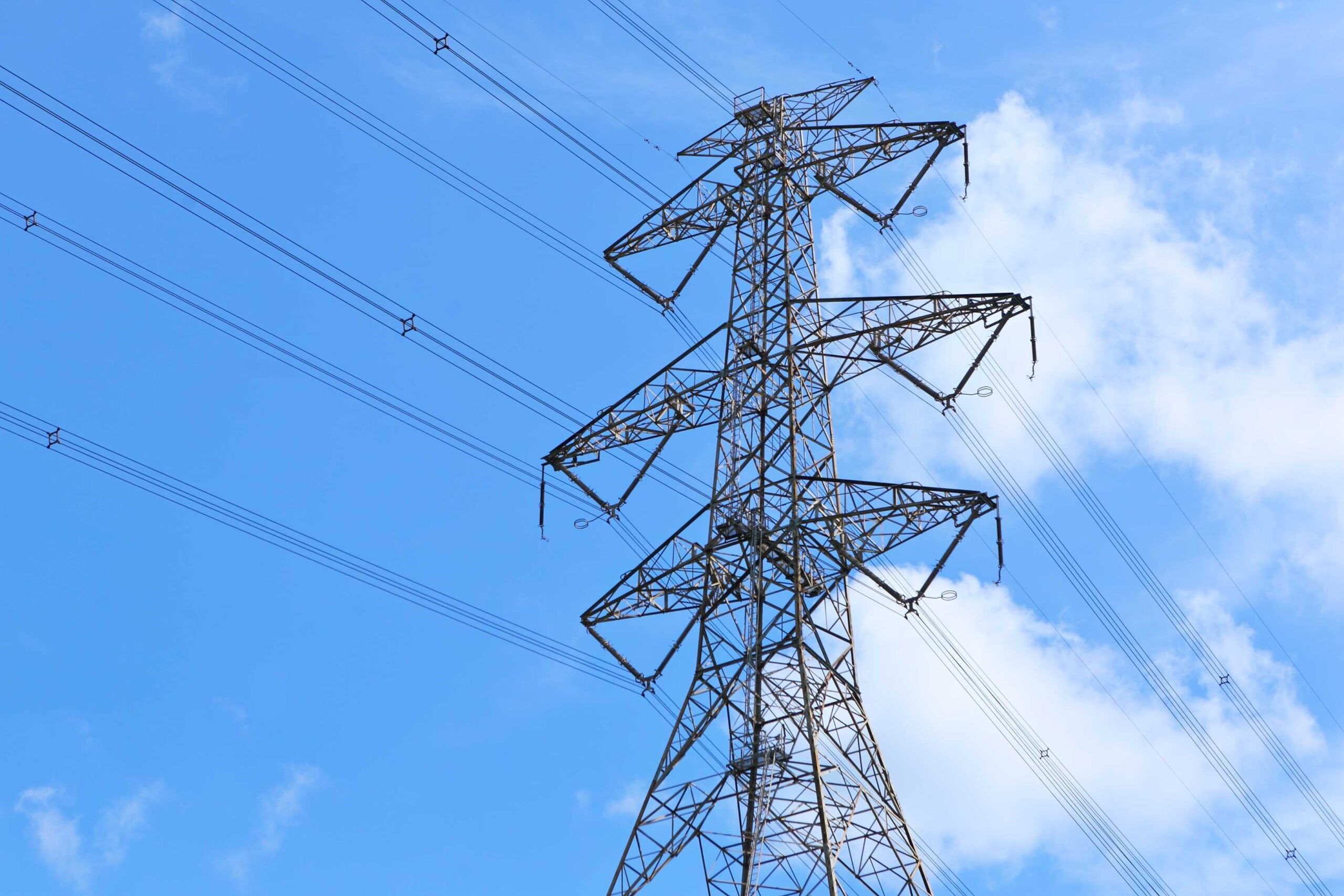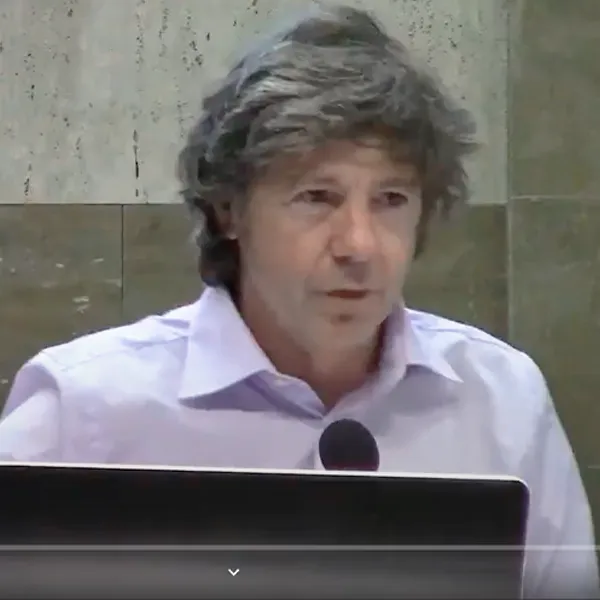This interview first took place on Facebook Live streaming on August 4th, 2020 at the Baricada Romania page. This transcription was originally published in the Romanian section of The Barricade on August 5th, 2020.
Today, we’ll be speaking with Vladimir Mitev, a Bulgarian journalist with a long history of reporting on events as they happen in this country. He will join us to talk once more about the protests taking place in Sofia, Bulgaria. We learned that there are tents set up at the intersections of boulevards in the streets of Sofia to call greater attention to these protests. On a previous occasion, we spoke with Vladimir about the way in which the protests first broke out and how they have evolved. It appears that there is a conflict in Bulgaria among the two anti-corruption camps: Everyone wants to fight against corruption —including President Radev and Prime Minister Borissov— but everyone has a different meaning of what the fight against corruption actually looks like. For Prime Minister Borissov and the Chief Prosecutor Geshev, anti-corruption meant that they search in the two cabinets in the presidency so that investigations are conducted. This was the last straw that outraged Bulgarians and incited them to protest against what Borissov and Geshev consider ‘anti-corruption’. We have seen some interesting evolutions at these protests as they grew into a kind of guerilla struggle between the protesters and the authorities as tents went up in the Bulgarian capital and the protests continued. Please share with us, Vladimir, how the events unfolded.
Hello to all of our listeners! We are in August, which is a month of holidays in Bulgaria. Protest organizers and participants have called for an expansion of protests in the past two weeks. An important element in this escalation is that some public spaces were occupied by protesters previously. In this case, a few road intersections in Sofia were blocked and as of August 3rd, 2020 roadblocks appeared in Varna as well, which means that there is additional pressure being placed upon the government. I think that this escalation was necessary according to the protesters because they feared that if protests didn’t grow and expand, they would get weaker and smaller.
You have touched upon a number of subjects and the issue of anti-corruption is very much of interest for more and more Romanians because the protests were officially announced as a protest of honest everyday citizens against “the mafia-captured state”. But in parallel to these protests we have had news on Law and Justice that doesn’t get discussed on the street-level. The main players in what I call “anti-corruption competition” in Bulgaria have asked the Constitutional Court to step in and declare the rights and obligations of their opponents. A group of protesters from the initiative “Justice for All” has put forth demands limiting the rights of the State Chief Prosecutor.
These issues are very complex and can’t be discussed and resolved in just one or two minutes. I would like to direct the readers’ attention to an article of mine which was published originally at the British website Open Democracy and was later republished at The Barricade. I think that this article could be key in understanding what is going on in Bulgaria.
But, briefly, Romania underwent a period of instigation and the public outpouring of emotions in the midst of its fight against corruption. Now, it looks like that there are two currents in the Bulgarian anti-corruption struggle. Their activity must be closely followed as each of them claims sincerely, or hypocritically, that it is inspired by or does what the Romanian fight against corruption used to do before…
I have read your article. You say that something good took place with regard to the investigations of the Bulgarian Chief Prosecutor, and that is that, unlike Romania where the main parties facing accusations were politicians, in Bulgaria, it is the businessmen who become the targets of the fight against corruption. Indeed, there were no fallen politicians but some big oligarchs have fallen in Bulgaria. This is different from Romania where politicians entered into the Prosecution’s line of sight, isn’t it?
More needs to be brought out because so far we don’t have any condemnations set against the oligarchs – we have businessmen who have been accused, but the judicial process against them is not over and I think that without the Court’s decision, we can’t say clearly whether there is a punishable offense. There are interpretations of facts and evidence as presented by the Prosecution but without a court ruling, it is difficult to say whether the suspicions were proven as facts. That is one thing we need to take into account.
There were a lot of rallying cries in the Romanian anti-corruption battle, and some were effective. We had the case with the oligarch Bozhkov, who’s still not been tried but who has lost his big business: “The National Lottery”. This is a real change – something changes in the economy, at the economic base of society. But the type of anti-corruption measures applied in Bulgaria are criticized for the supposed use of State institutions by oligarchs close to the power who direct them against their adversaries in retaliation because they may have lost political support.
I have heard some people claim that Romanian anti-corruption efforts did not quite target large corporations. Maybe your question connects in this context – isn’t it good that the economic elites are hit? But, if it is true that we have a fight between different oligarchs that takes place through the use of anti-corruption legislation, it would be more difficult to define what is good and what is wrong.
I got it. You said on another occasion that polarization has grown in Bulgaria: it has become easier for some people to identify who is good and who is bad now – there are two camps firmly established: those who are pro- or anti- the protests. But do people suffer if they don’t strictly fall into either category?
I have observed that the tolerance level on social media is low. There is instigation taking place because there is a fight for power. Some people want to topple a party which has ruled the country for the past eleven years out of power, even if it has ruled with small pauses in-between. We also have a lot of dissatisfaction, some of it related to the COVID-19 (coronavirus) crisis, and some related to ongoing social problems. There is a desire for a more swift and thorough change in Bulgaria.
There is also an impression, as I have written on Open Democracy, that the social elevators of upward mobility don’t work for many people. A part of the dissatisfaction towards GERB (a center-right Bulgarian political party) is explained by the fact that this party has allowed its members to flourish while others don’t have the means to develop in the same ways. There are a lot of contradictions, discussions about conspiracies, doubts raised on Facebook, and lines of division have appeared throughout Bulgarian society. But we also need to think about how to evolve as a society, not focus on how to destroy ourselves reciprocally.
I see. What direction do you think things will take? You can’t know what will become of everything but what’s the best-case scenario – and perhaps a pessimist outlook – in regard to the Bulgarian protests?
I always fear that our protests don’t manage to produce something new. Yesterday, we learned of an opinion poll, which showed that there is a change with regard to the support for the various political parties. But the parties that would enter the Parliament are not new themselves with the exception of the party of a showman, who is, however, an old face in Bulgarian public space. If the protests are against all who have been stained in the process of transition, I would like it to produce new political faces, new programs and visions. I think that something is being attempted in this regard in Left-wing circles. The idea for people’s assemblies has reappeared. There are discussions being made literally on the public square. It is probably something utopian, but I would be happy if people managed to overcome their suspicions towards collective efforts, or grassroots movements. I hope that we can protest not only as 100,000 individuals but also as a community. And this community must have a clear idea of what they mean by change and have the means to achieve it.
Your perspective is very interesting. I invite our readers to visit The Barricade and to read your analysis on the protests because they are thoughtful and overcome the emotions at this very moment in history.
Photo: The protesters have established a free zone at the Eagle’s Bridge crossroad, which is called Eagletown (Orlov grad) (source: YouTube)
The Barricade is an independent platform, which is supported financially by its readers. Become one of them! If you have enjoyed reading this article, support The Barricade’s existence! We need you! See how you can help – here!










